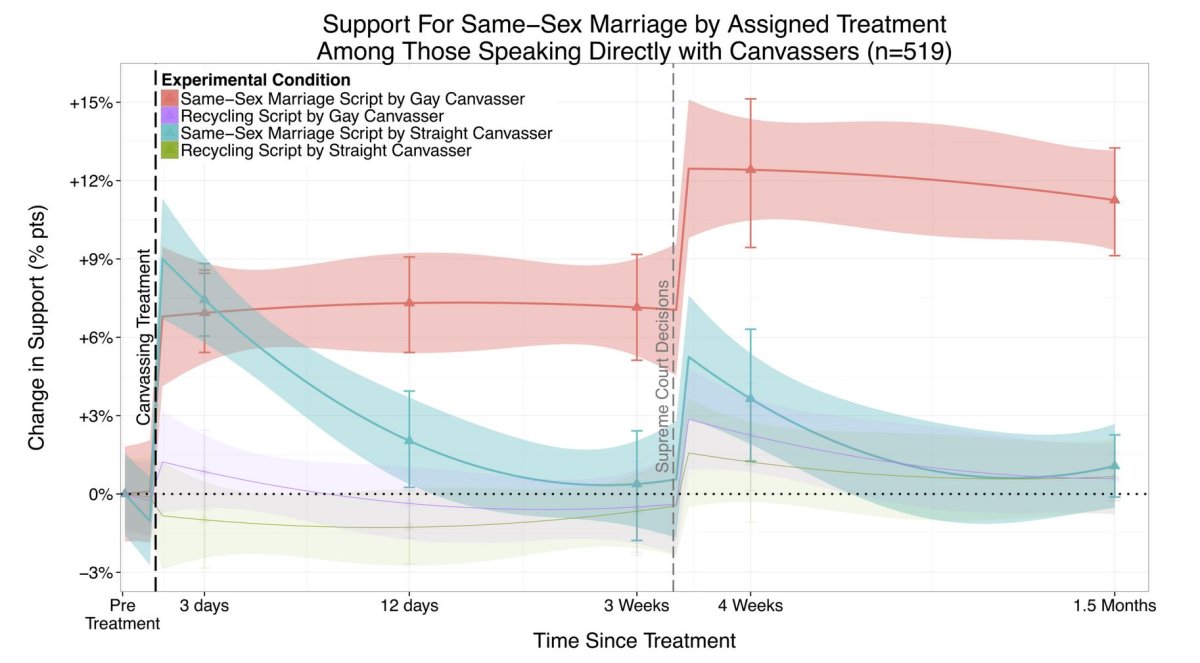Warning: This post contains language that some readers may find offensive. Discretion is advised

Working in the online world can be a bit of a minefield — the web is full of fakes, frauds and hoaxes. Sorting through them all can be equally frustrating and entertaining. Global News spends a lot of time verifying online material, as do sites like Storyful (some even read through reams of documents, like the Verification Handbook, explaining how). What better thing to write a weekly column about?
Here’s this week in real and fake stuff on the web (and here’s even more fake stuff from the past month).
Same-sex marriage attitudes research
A number of publications were forced to retract stories this week about research that was revealed as fraudulent.
The study, by Donald Green and Michael LaCour, appeared in the academic journal Science. It reported that people were much more likely to support same-sex marriage after speaking about the issue with gay canvassers.
The story was covered by Vox, This American Life, The New York Times, and The Wall Street Journal, among others.
Two academics were so impressed by the study that they decided to continue the research. But, they said, when they started looking in to it, “irregularities” arose. According to the researchers’ timeline, Green said on Monday he had confronted LaCour about the issues.
MORE FAKE: Beards full of poo, invented illness, and other things that were fake
The next day, a retraction note appeared next to the study listed on his website.
https://twitter.com/dylanmatt/status/601017156474642432
Vox writer Dylan Matthews posted a retraction on its story. “Update: It turns out that the Michael LaCour and Donald Green study described here really was ‘miraculous’: it wasn’t true,” he said.
“In the interest of full disclosure, my original post describing the study is below. But in light of the retraction, don’t believe any of its findings.”
The journal Science also published an “editorial expression of concern” over the article.
The study, with its amazing findings, was…
North Korea Photoshop

The secretive nation of North Korea released photos this week showing a ballistic missile being launched from a submarine.
But according to James Winnefeld, chairman of the U.S. Joint Chiefs of Staff, North Korea is “many years” from having this capability, and the images were manipulated.

Get breaking National news
Reuters reported that two German aerospace engineers called the photos “strongly modified.”
Among the inconsistencies, the reflection of the flame in the water did not line up with the missile.
- Halifax Walmart death: Store will not reopen for ‘weeks’ as remodelling continues
- Will Canada’s tax ‘holiday’ create a ‘mess’ for businesses? Some say yes
- Can you tell fake alcohol from real? Why methanol is so hard to detect
- Alberta seeks to ‘de-risk’ oil, gas pipeline investments in wake of Trump victory
But this wouldn’t be the first time a Photoshopped image came from the hermit kingdom. Among some of its past works:
This manipulated photo from the funeral procession of Kim Jong-il, analyzed by the New York Times. Note the missing photographers on the left side.
As well as this classic…
…showing inconsistent shadows in a photo released at a time when North Korea was denying Kim Jong-il had suffered a stroke.
This new batch of photos from North Korea are most likely…
Human Barbie in jorts Photoshop
Speaking of bad Photoshopping, the “shocking” news made the rounds this week that Human Barbie Valeria Lukyanova altered some of her recent Facebook photos of herself in tiny jeans shorts.
MORE FAKE: The Zombie Fortress, a CN Tower in Germany, and other things that were fake
She told Cosmopolitan magazine, “The pictures are Photoshopped to achieve smoothness and color correction. The pictures were taken in the botanical garden on the phone. They were not high quality. I had to edit them in order to correct the defects of the phone.”

All the news that’s fit to crop
The bad Photoshopping didn’t end there. Twitter users this week caught something missing in a photo of the Israeli cabinet printed in an ultra-Orthodox newspaper: the women.

The newspaper, Yomleyom, Photoshopped out the women in the cabinet in accordance with ultra-Orthodox traditions, which forbid showing women in print or on the web.
The only problem? It forgot to crop out one woman’s feet, circled in the picture to the left, above.
Fake promoted tweets spread hate
This week, staff in the Global News newsroom were alerted to the following Tweet, sent via email from Dataminr, a program that uses an algorithm to flag potentially newsworthy posts.
The hateful language in the Tweet attracted attention, and appeared to come from the account of an Australian feminist campaigner named Caitlin Roper.
Twitter users were outraged:
https://twitter.com/youngvulgarian/status/601036114061828096
The account was soon suspended by Twitter. Then the real Caitlin Roper stood up:
Note that the first account’s username had an extra ‘r’ on Roper. It was a troll account meant to look like her, and was then promoted to increase its visibility.
Gawker soon tracked down a message on the site 4chan, taking credit for the tweets and saying they were paid for with a prepaid credit card.
“Remember when I told you that I was gonna use Twitter Ads to send out promoted Tweets telling trannies to kill themselves?” the anonymous poster wrote.
“Well, guess what? I just did it.”
The series of hateful Tweets was, thankfully…

















Comments